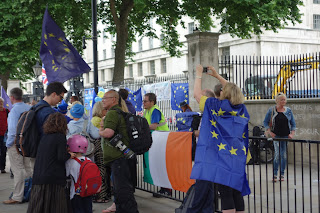Speaking on
19 June 2017,five days after the Grenfell Tower blaze, the Chancellor Philip
Hammond said; "My understanding is that the cladding in question, the
flammable cladding which is banned in Europe and the United States, is also
banned here..."
At prime
minister’s questions in Parliament on Wednesday, Theresa May said her
“understanding” was that the cladding that has failed the test “was
non-compliant with the building regulations”.
She said as
well as identifying who was responsible for the devastating fire at Grenfell
Tower, the public inquiry would also need to look at “why it is that over
decades, under different governments and under different councils, material has
been put up on tower blocks that is non-compliant with the building
regulations”.
Both of these
statements from the most senior members of the Tory government are at best
misleading, at worse completely untrue. I’m not saying they are lies, because
that would require some evidence that Hammond and May knew what they were
talking about, which I’m unsure of at this stage.
The statements
are factually wrong though, according to experts in the field.
Barry Turner, director of technical policy at the Local Authority Building Control, told the Local Government Chronicle (subscription) that the document the prime minister referred to, Approved document B, was guidance, not a legally required regulation.
In addition
he said Mrs May’s comments left out a crucial part of the guidance that allows
use of a flammable cladding if it passes a “composite” test that includes other
components surrounding the cladding, such as insulation.
Mr Turner
said: “Within [the government’s] own guidance they’re very conveniently
forgetting the paragraph that appears before the one they are quoting which
allows an alternative method of testing a complete cladding system.”
Mr Turner
said it was not surprising that cladding on all 137 tower blocks tested so far
had failed as the Building Research Establishment (BRE) was carrying out a
different test to the one specified in the guidance.
The tests
being carried out for the government by the BRE are only testing cladding and
do not take account of any other fire safety measures, such as flame retardant
insulation.
David Orr,
chief executive of the National Housing Federation, has also said that it is
“possible for buildings to be safe with that cladding in certain circumstances”.
Interviewed
on BBC Newsnight on Wednesday he said: “All of this cladding has been fitted
according to the rules that were in place at the time, according to the rules
that were presided over by government.”
Lord Porter, Tory
chairman of the Local Government Association, said fire safety tests on
cladding from high-rise buildings were flawed.
He criticised
the tests for focusing on the core of the panel - rather than the panel as a
whole.
He told BBC Radio 4's Today programme
that "isn't the right thing to test", adding: "The government
needs to listen to a wider set of opinions and not just the experts they have
got."
So, the test
they are doing on the Grenfell Tower cladding alone, doesn’t prove that the cladding was fitted against building
regulations, it depends on the insulation used and other materials used that
make up the whole construction.
But these regulations
should have been tightened up, by the government, after an earlier fire at a
residential tower block.
In 2009 a
fire took hold in flats at Lakanal House in London which saw six people die.
Following an inquest into the fire the coroner made a number of recommendations
to the government and to other organisations like the London Fire Brigade and
Southwark Council for how similar fires could be avoided in the future.
The
recommendations made to the government in 2013 included:
‘Reviewing
Document B (fire safety) of the Building Regulations to ensure that it is
easily understandable and give guidance to those who are responsible for
maintaining tower blocks, as well as building them.’
“Four years
on and no review has been completed despite assurances from former housing
minister Gavin Barwell, who is now Theresa May’s chief of staff,” reported
the Telegraph.
The BBC reports that leaked
letters from the All-Party Parliamentary Fire Safety Rescue Group to the
government show that it repeatedly warned four different housing ministers that
action needed to be taken on fire safety regulations.
One of the letters
to the government says:
“Surely
however when you already have credible evidence in 2012 to justify updating a
small but important part of the guidance in the Approved Document, which will
lead to saving of lives, you don’t need to wait another three years in addition
to the two already spent since the research findings were updated, in order to
take action?
The government
says the work is still ongoing.
Today, the BBC and the Times
reported having seen documents showing that the original cladding specified for
the Tower had been a zinc cladding with a fire-retardant core, but in 2014 this
was changed to ACM cladding with a PE core to save £293,000 and to allow a
change of colour. However, the BBC point out that ‘both types of cladding have
the same official fire rating’ (it is not clear what is meant by the word
‘official’).
The motives
of the local authority, Kensington and Chelsea, in changing to using this type
of cladding are reprehensible then, saving money and making it a nicer colour when
viewed from outside, but appears to be within the law as it stands.
But in the
end, why did the government not amend the regulations when they had been warned
that this needed to happen? Uncaring and incompetent, which just about sums up this
Tory administration.
Come to the ‘Not One More Day’
protest in central London tomorrow against the Tory government. Tories Out!
































